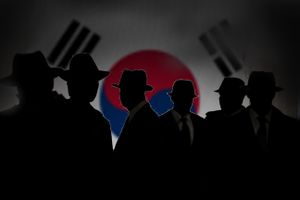Difference between revisions of "South Korea/Deep state"
(→Origins: adding misc info) |
(Typos) |
||
| Line 17: | Line 17: | ||
When World War 2 ended, the southern part of the Korean peninsula, formerly a colony of Japan, passed to US rule, while the northern part came under Soviet control. | When World War 2 ended, the southern part of the Korean peninsula, formerly a colony of Japan, passed to US rule, while the northern part came under Soviet control. | ||
| − | The first [[South Korean President]] was the US educated [[Syngman Rhee]], installed by the US military administration on 24 July [[1948]], after winning 92.3 | + | The first [[South Korean President]] was the US educated [[Syngman Rhee]], installed by the US military administration on 24 July [[1948]], after winning 92.3% of the votes in a rigged election.{{cn}} |
| − | Scrambling to find a power base for an administration of its area of | + | Scrambling to find a power base for an administration of its area of influence, the US chose to rely on several reactionary factions. {{cn}}) |
*One noticeable group was the former collaborators with Japan, especially in the colonial police and members of the Japanese Imperial Forces, who essentially formed the core of the new South Korean police, intelligence services and army. {{cn}}) | *One noticeable group was the former collaborators with Japan, especially in the colonial police and members of the Japanese Imperial Forces, who essentially formed the core of the new South Korean police, intelligence services and army. {{cn}}) | ||
| Line 28: | Line 28: | ||
*Fourthly, fundamentalist Christian groups/sects, like the [[Unification movement]] ('[[Moonies]]'), under pastor [[Sun Myung Moon]], have an outsize influence in the power system.{{cn}}) | *Fourthly, fundamentalist Christian groups/sects, like the [[Unification movement]] ('[[Moonies]]'), under pastor [[Sun Myung Moon]], have an outsize influence in the power system.{{cn}}) | ||
| − | |||
During the Korean war, the security apparatus (military, police, intelligence services) was deeply aligned their US counterparts, creating an integrated system where the US had the final say. This deep state system remains in place to this day.{{cn}}) | During the Korean war, the security apparatus (military, police, intelligence services) was deeply aligned their US counterparts, creating an integrated system where the US had the final say. This deep state system remains in place to this day.{{cn}}) | ||
Revision as of 09:36, 1 February 2020
(Deep state) | |
|---|---|
 | |
| Formation | 24 July 1948 |
| The South Korean Deep state | |
The South Korean Deep state was exposed in 2016 when South Korean President Park Geun-hye was shown to have been under the influence of Choi Soon-sil.
History
- Full article:
 Korean War
Korean War
- Full article:
The Korean War killed or injured millions of Koreans and devastated the country. It also confirmed the de facto partition which had emerged after the defeat of Japan at the end of World War II and established the position of the US Deep state as firmly in charge (as also did in Japan[citation needed]).
Origins
When World War 2 ended, the southern part of the Korean peninsula, formerly a colony of Japan, passed to US rule, while the northern part came under Soviet control.
The first South Korean President was the US educated Syngman Rhee, installed by the US military administration on 24 July 1948, after winning 92.3% of the votes in a rigged election.[citation needed]
Scrambling to find a power base for an administration of its area of influence, the US chose to rely on several reactionary factions. [citation needed])
- One noticeable group was the former collaborators with Japan, especially in the colonial police and members of the Japanese Imperial Forces, who essentially formed the core of the new South Korean police, intelligence services and army. [citation needed])
- Another was the feudal landlords and aristocracy, tainted by collaboration, but still maintaining their wealth and influence.[citation needed])
- A third noticeable group was the refugees from the north of the peninsula, including feudal landlords and their private goon squads, that with US support founded anti-communist groups that to this day have large influence in the South.[citation needed])
- Fourthly, fundamentalist Christian groups/sects, like the Unification movement ('Moonies'), under pastor Sun Myung Moon, have an outsize influence in the power system.[citation needed])
During the Korean war, the security apparatus (military, police, intelligence services) was deeply aligned their US counterparts, creating an integrated system where the US had the final say. This deep state system remains in place to this day.[citation needed])
Economic corruption
The Korea economy is dominated by a few large companies.[citation needed]
Sudden deaths
Former Korean President, Roh Moo-hyun reportedly killed himself in 2009 by jumping off a cliff near his house, resulting in fatal head injuries.
Exposure
In 2016 it emerged that the President Park Geun-hye had been sharing classified documents with Choi Soon-sil since at least 2013. This lead to her been regarded as a puppet leader. Massive peaceful demonstrations ensued in Seoul. She hung on for months but eventually resigned.
The Korean National Intelligence Service was engaged in election rigging using trolls to try to get her elected, and that "The Chosun Papers (the country’s largest daily), had likely been aware of critical components of the scandal all along, and simply kept quiet. Critics perceived this as a deliberate attempt by the media to execute its own master plan for puppeteering Park."[1]